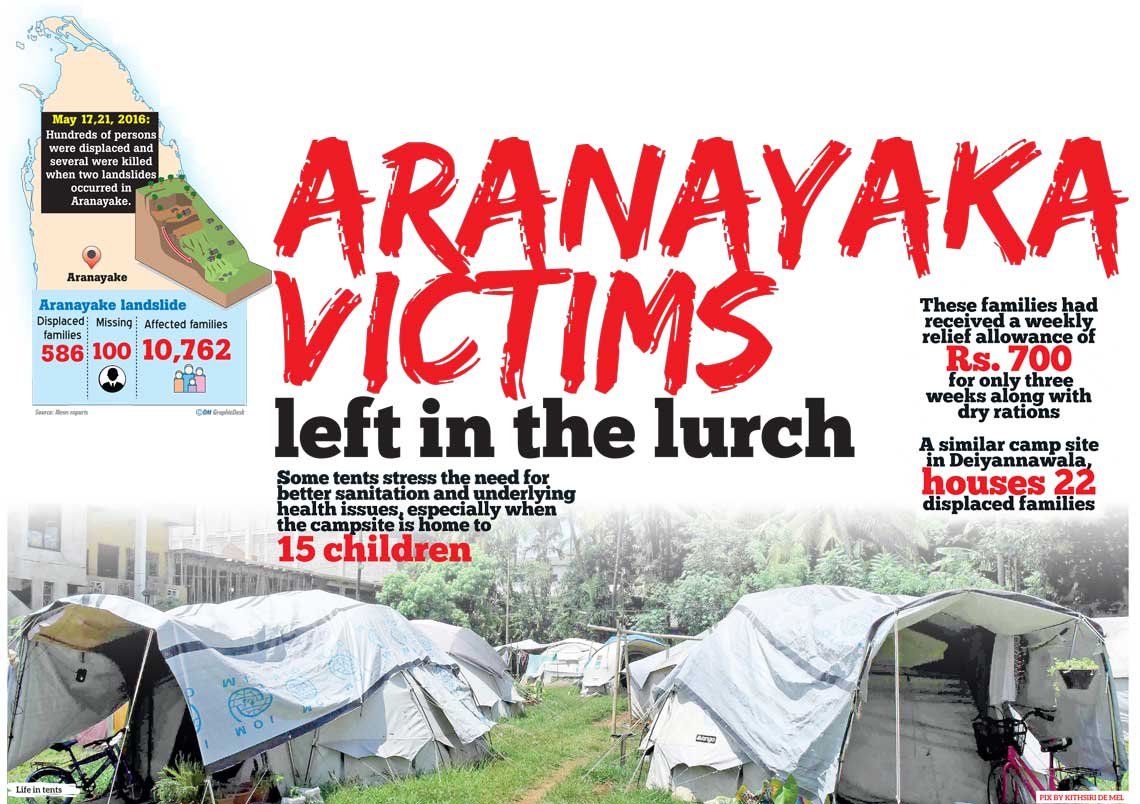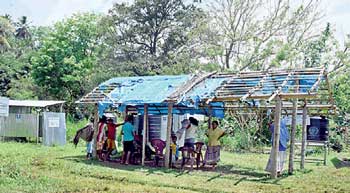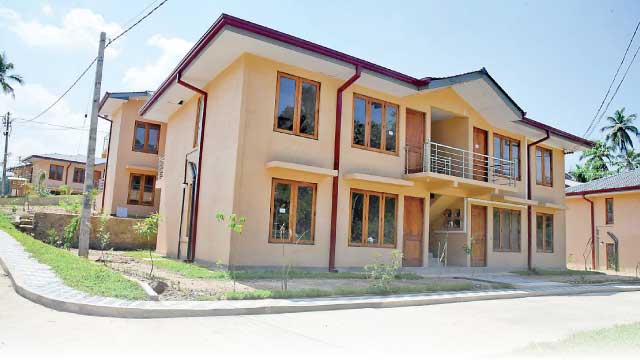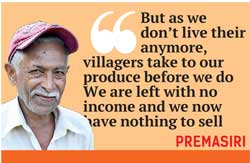Reply To:
Name - Reply Comment

 A group of men and women sit under a thatched hut, just outside a temporary camp hidden in plain sight, in the town of Dippitiya, Aranayaka. The dilapidated hut is home to 14 families when the sweltering heat inside their tents is unbearable. The women sit accompanying their children with cloth covering their heads, as the shelter does little to give them cover against the scorching sun. The young ones attend to their homework, on makeshift tables, while their mothers look on.
A group of men and women sit under a thatched hut, just outside a temporary camp hidden in plain sight, in the town of Dippitiya, Aranayaka. The dilapidated hut is home to 14 families when the sweltering heat inside their tents is unbearable. The women sit accompanying their children with cloth covering their heads, as the shelter does little to give them cover against the scorching sun. The young ones attend to their homework, on makeshift tables, while their mothers look on.
 In the raw days after the 2016 landslide in Aranayaka, politicians queued to deliver promises of restoring normalcy to lives affected by the disaster. Accordingly, a larger number of the victims were relocated at temporary housing, while others have received compensation or moved into housing provided by the Government. Still others who can afford housing, have sought to occupy rented houses. This unfortunate group of fifteen families who was unable to do so, has been in these tents for almost two years now.
In the raw days after the 2016 landslide in Aranayaka, politicians queued to deliver promises of restoring normalcy to lives affected by the disaster. Accordingly, a larger number of the victims were relocated at temporary housing, while others have received compensation or moved into housing provided by the Government. Still others who can afford housing, have sought to occupy rented houses. This unfortunate group of fifteen families who was unable to do so, has been in these tents for almost two years now.
“It really doesn’t matter if it rains or not,” says one victim. “When the skies are clear, the heat is unbearable. Although we are used to living in camps for almost two years, the humid tents are merciless when the temperature rises. We get no rest during the day or at night,” the victim goes on. A glimpse into life inside a tent is enough to attest to this statement. These families sleep on soiled mattresses laid out on the ground, some lined with plastic sheets, and covered with mended mosquito nets. The children, aged as young as four and five, eager to show us their living quarters, crawl into the tents to show us where they play, right next to a single burner stove and a small cylinder of gas, where they keep several pots and pans.
Come the monsoons, their lives take a turn for the worse, we learn. “When it rains, we have to pull out and dry everything inside the tents, from mattresses to clothes, with the little amount of sunlight we get. With every rainfall, this ground is easily flooded. We can’t even cook our meals during the rain. All of us huddle under the hut where it is safer,” says another victim. Their tents are in a state of decay and worsens with every shower of rain. Even when the rains subside, not only does it leave dampened spirits, but also an intolerable stench, which does not wane for weeks.
A distinct mud like odour fills the air of the campsite. Even though several NGOs have erected boards indicating safe sanitation practices, residents say managing sanitary waste has been a nightmare. “We have to clean the septic pits ourselves every time the toilets overflow. We have made several requests to the authorities to assist us, but ultimately we rely on ourselves to clean the area,” one man says. Some tents where rodents have gnawed into, creating gaping holes, stress the need for better sanitation and underlying health issues, especially when the campsite is home to 15 children.

Immediately after the disaster, these families had received a weekly relief allowance of Rs. 700 for only three weeks along with dry rations. The families of the Dippitiya camp are residents of Galbokka, Narangala and Pallebokke, areas surrounding the Samasara hill, identified as high-risk zones following the deadly landslide. Since the evacuation, these families have had no income. This displaced agricultural community was once heavily dependent on the income of crops such as tea, coffee, pepper and areca nut. Now that they have left their abode atop the hill, these families have been rendered helpless.
“From time to time, we visit our lands on top of the hill, where we have some crops left. But we can’t afford to do it everyday. The distance and the cost are too much,” some of the residents say. A considerable number of victims who cannot bear the costs or the life in these camps have returned to their homes on top of the Samasara hill, which was declared a high-risk evacuation zone.
Housing delayed
 The camp in Dippitiya is not the only site in Aranayaka which houses the displaced. A similar camp site in Deiyannawala, houses 22 displaced families. Yet, unlike these families, they have been provided with water and electricity. Interestingly this camp site is not their first settlement. Until December, the displaced had taken refuge in Ussapitiya grounds in Aranayaka. They had been asked to evacuate the ground, so that the district administration could host a musical show there on December 29. In December they had also been promised new houses built with the aid granted by the Government of China. Residents claim that their house numbers have been allocated as well. “Authorities have already allocated houses within the newly constructed housing complex in Ruwandeniya, Ussapitiya. But they have not informed us of a date to move in,” claims one resident of the Dippitiya camp.
The camp in Dippitiya is not the only site in Aranayaka which houses the displaced. A similar camp site in Deiyannawala, houses 22 displaced families. Yet, unlike these families, they have been provided with water and electricity. Interestingly this camp site is not their first settlement. Until December, the displaced had taken refuge in Ussapitiya grounds in Aranayaka. They had been asked to evacuate the ground, so that the district administration could host a musical show there on December 29. In December they had also been promised new houses built with the aid granted by the Government of China. Residents claim that their house numbers have been allocated as well. “Authorities have already allocated houses within the newly constructed housing complex in Ruwandeniya, Ussapitiya. But they have not informed us of a date to move in,” claims one resident of the Dippitiya camp.
The China - Sri Lanka Friendship Village in Ruwandeniya constructed with Rs. 22.5 billion worth financial assistance from the Government of China was expected to  shelter 60 families by the end of 2017. However, victims say that even though the construction of the housing complex has been completed, several factors including the Local Government Elections have delayed the granting of these houses.
shelter 60 families by the end of 2017. However, victims say that even though the construction of the housing complex has been completed, several factors including the Local Government Elections have delayed the granting of these houses.
The Daily Mirror spoke to Divisional Secretary of Aranayaka Z.A.M. Faizal to find the reasons for this delay. Faizal says the Divisional Secretariat is unable to provide exact details as the Chinese Ambassador is yet to provide a date to vest the Ruwandeniya village to the public. “We are processing the documents of ownership for victims of the disaster. But due to the delay on part of the embassy we have been unable to give a specific date. A new ambassador was appointed which was one reason for the delay. We expect to finalise a date within the next week and open the village to the public with the presence of the Minister and Chinese diplomats,” says Faizal.
The China - Sri Lanka Friendship Village in Ruwandeniya constructed with Rs. 22.5 billion worth financial assistance from the Government of China was expected to shelter 60 families by the end of 2017. However, victims say that even though the construction of the housing complex has been completed, several factors including the Local Government Elections have delayed the granting of these houses.
According to Faizal, the China - Sri Lanka Friendship Village was initially expected to be a compound of 100 houses. Only 60 of these houses have been constructed so far under the first phase and the remainder will be constructed under the second phase of the project. “We have provided housing to all those who lost their homes in the disaster. The people living in the two camps in Aranayaka are only those who were evacuated from the high-risk zones. All 586 displaced victims of the disaster will be provided with housing by the Government when these 60 houses are vested in public,” adds Faizal.
In dire straits
While some of the landslide victims remain in camps, members of another group are struggling to restore their lives to normalcy. Under the National Insurance scheme for Natural Disasters every small and medium scale industry damaged due to natural disasters is entitled to an insurance coverage of up to a maximum of Rs. 2.5 million, paid based on damage assessment. The first installment of Rs. 40,000 was given to beneficiaries who expressed willingness to construct houses in Government or private lands using their labour to prepare the land. The next five installments were to be released for beneficiaries when they complete the foundation and the roof, construct the walls up to the linton level, finish doors, windows, plastering and painting.
 Premasiri, an ageing cultivator who has been relocated to Dippitiya, is now a beneficiary of this scheme. It was not all plain sailing for this cultivator however. His original residence is in Siripura, Elangipitiya on top of the Samasara hill. Before the landslide, Premasiri was a self-sufficient man with acres of cultivated tea and other commercial crops. Under the compensation scheme, to be eligible for compensation of one million and six hundred thousand rupees, he had to completely demolish his residence in the estate on Samasara hill. “The Government has allowed us to reap the profits of our cultivations. Therefore every other day we visit the estate on top of the hill,” he says. This journey takes one bus ride and a 4 km trek up the hill from his current residence in Dippitiya. “We are not allowed to do anything in our estates, except to reap the produce. But as we don’t live their anymore, villagers take to our produce before we do. We are left with no income and we now have nothing to sell. Our only income is from a small portion of tea leaves we are able to gather every now and then,” he lamented.
Premasiri, an ageing cultivator who has been relocated to Dippitiya, is now a beneficiary of this scheme. It was not all plain sailing for this cultivator however. His original residence is in Siripura, Elangipitiya on top of the Samasara hill. Before the landslide, Premasiri was a self-sufficient man with acres of cultivated tea and other commercial crops. Under the compensation scheme, to be eligible for compensation of one million and six hundred thousand rupees, he had to completely demolish his residence in the estate on Samasara hill. “The Government has allowed us to reap the profits of our cultivations. Therefore every other day we visit the estate on top of the hill,” he says. This journey takes one bus ride and a 4 km trek up the hill from his current residence in Dippitiya. “We are not allowed to do anything in our estates, except to reap the produce. But as we don’t live their anymore, villagers take to our produce before we do. We are left with no income and we now have nothing to sell. Our only income is from a small portion of tea leaves we are able to gather every now and then,” he lamented.
Even though Premasiri’s story is a more fortunate one, it was clear that he has been swindled off the little money he had, when we visited his new abode. The house has been constructed in the corner of a paddy field, converted into a landfill, a cost bearing exercise. Premasiri’s faith in a Government contractor to construct his new house has been futile as they now live in a poorly constructed house with makeshift doors. “We received no compensation for over a year now. I am yet to receive the final installment of my housing compensation. The trek uphill is difficult as I am old now. It is difficult to make ends meet,” he grumbles.
U.G Senevirathne, another cultivator of Bakulwala, says he has only received 800,000 rupees of the housing compensation. “The authorities have asked us to completely demolish our houses. But we visit the estates often to collect the produce. As we have destroyed our houses, we have no place to even cook from or take shelter when it rains. Workers no longer seek employment in these estates ever since the disaster. We must pluck the tea ourselves. To travel from our new home to the estate the bus fare alone comes up to Rs. 200. The Government must look into our needs,” stresses Senevirathne.
Some residents speaking to fear to disclose their identities as they believe it would impede the payment of compensation or the provision of housing. They have received the blunt end of the stick even when their pleas are heard, victims say.